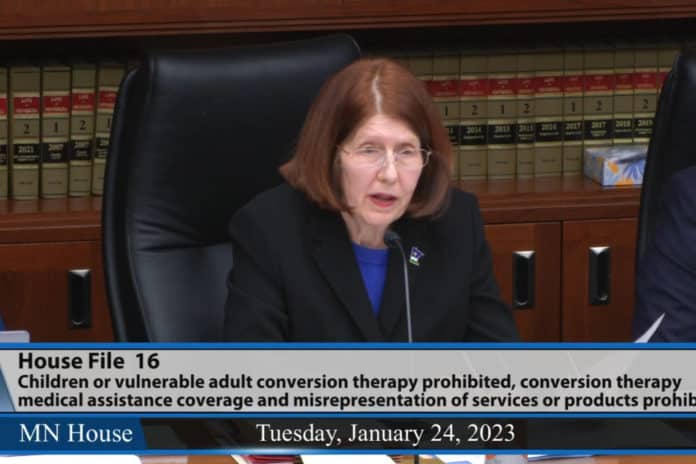
DFL legislators shot down an attempt by Republicans in a committee hearing last week to add language to a conversion therapy ban bill that would prohibit medical professionals from performing gender transition-related medical services on children.
The language was offered as an amendment to HF16/SF23, a bill being touted by its DFL sponsors as a statutory ban on the professional practice of conversion therapy for minors and vulnerable adults who identify as LGBTQ.
Gov. Tim Walz signed an executive order in 2021 prohibiting the use of state funds to pay for conversion therapy. But DFL sponsors of the bill in prior sessions have been unable to get it passed in both the House and Senate.
The conversion therapy ban legislation has received support from several professional organizations, including the Minnesota Medical Association and health care providers like Children’s Minnesota and Hennepin Healthcare. But the bill has also been criticized by several mental health professionals and religious organizations who told legislators the language is ambiguous, overly broad and could lead to violations of First Amendment speech and client-patient confidentiality in talk therapy sessions.
“Whatever one’s views on sexual orientation or gender identity, foreclosing a therapist from having a conversation with a minor about psychosexual development is a disservice to the child, and undermines the idea that there is real choice involved,” said Maggie Hangge of the Minnesota Catholic Conference, the public policy voice of the Catholic Church in Minnesota.
Despite those concerns, the conversion therapy ban bill received support from two different House committees last week on mostly party-line votes. It’s now headed for a hearing in the House Commerce and Finance Committee. That came after an 11-9 party-line vote by DFLers in the House Health Finance and Policy Committee to reject a Republican-backed amendment to the bill that would prohibit “gender transition medical services [for minors] … that assists an individual in transitioning physically to a sex different from the individual’s birth sex.”
“We just have to stop messing around with kids in any way,” said Rep. Anne Neu Brindley, R-North Branch, who supported the amendment that would prohibit gender transition-related medical services to minors, even as she verbally expressed support for some elements of the overall conversion therapy ban bill. “For me that includes conversion therapy; we should not be doing that to kids. It also includes saying kids should not make permanent decisions about their physical bodies.”
But DFLers who voted down the amendment that would ban gender transition-related medical procedures for minors said the amendment’s language was overly broad in its own right.
“This amendment is extremely broad,” said Rep. Tina Liebling, DFL-Rochester, “and it includes banning even use of interventions to delay pubertal development in children, which by their very definition are not permanent.”
But others said that administering puberty blockers to minors does have a lasting impact on young people.
“This amendment is basically saying that [gender] fluidity is not unidirectional,” said Rep. Duane Quam, R-Byron, who voted in support of the amendment.
Rep. Athena Hollins, DFL-St. Paul, said the amendment was based on misconceptions and claimed that “surgically altering children (as a part of gender transition) just isn’t factual, based on the conversations I’ve had with practitioners.”
After DFLers voted down the amendment, they voted to move the conversion therapy ban bill along to its next committee review, with the support of Rep. Danny Nadeau, R-Rogers, who said he wanted to make sure the legislation “does not prohibit pastors and mental health professionals specifically from talking about the pros and cons of all therapies.”
Hollins said the bill’s language would not affect religious or individual prayer practices.
“The restrictions only apply for paid for services. So absolutely an individual could still have a conversation with their pastor about where they are, how they are feeling, there’s no restrictions on that.”
The language of the overall bill reads the following:
“‘Conversion therapy’ means any practice by a mental health practitioner as defined in section 245I.02, subdivision 26, or mental health professional as defined in section 245I.02, subdivision 27, that seeks to change an individual’s sexual orientation or gender identity, including efforts to change behaviors or gender expressions or to eliminate or reduce sexual or romantic attractions or feelings toward individuals of the same gender. Conversion therapy does not include counseling that provides assistance to an individual undergoing gender transition, or counseling that provides acceptance, support, and understanding of an individual or facilitates an individual’s coping, social support, and identity exploration and development, including sexual-orientation-neutral interventions to prevent or address unlawful conduct or unsafe sexual practices, as long as the counseling does not seek to change an individual’s sexual orientation or gender identity.”
Hank Long
Hank Long is a journalism and communications professional whose writing career includes coverage of the Minnesota legislature, city and county governments and the commercial real estate industry. Hank received his undergraduate degree at the University of Minnesota, where he studied journalism, and his law degree at the University of St. Thomas. The Minnesota native lives in the Twin Cities with his wife and four children. His dream is to be around when the Vikings win the Super Bowl.











